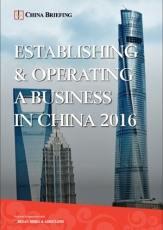Q&A: Investing in China’s Food and Beverage Industry
A cursory glance at a few key statistics will quickly reveal the size and potential of China’s food & beverage industry. In 2011, the Middle Kingdom overtook the U.S. as the world’s largest consumer market for food & beverage products. Driven by a string of food scandals, a preference for foreign goods that are perceived to be safer shows no sign of abating, with 71 percent of Chinese people considering food safety a concern in 2015. And the country increasingly has the means to purchase foreign products – average disposable income levels continue to rise at an exponential rate, doubling from RMB 15,000 in 2008 to RMB 31,000 in 2015.
In this article, we aim to answer some of the most commonly asked questions regarding investing in China’s rapidly developing food & beverage industry.
Q: What are some of the enduring challenges in China’s food and beverage industry today?
A: China’s food and beverage industry has more potential for foreign investment than ever before. However counterfeit goods and an underdeveloped infrastructure continue to threaten the industry’s growth. China is seeing a trend towards utilizing e-commerce to purchase food. As demand increases, the physical infrastructure in place is struggling to keep up. A lack of proper cold storage warehouses, inefficient distribution channels, and growing demand threaten to strain an underdeveloped infrastructure.
Q: How will China’s revised 2015 Food Safety Law affect foreign businesses in China’s food & beverage industry?
A: China’s revised 2015 Food Safety Law cuts down the number of regulations in China’s food industry. The regulatory environment will be easier to understand and simpler for foreign businesses to navigate. However, as China becomes more heavy handed upon its food industry, foreign business should not fail to recognize that they will face a steady increase in competition as new regulations go into effect. If China is able to increase the quality of its domestic food products, and convince its population that local food standards can be trusted, some Chinese consumers may no longer find it necessary to buy foreign food products.
![]() RELATED: Find more Q&As on Dezan Shira’s Knowledge Sharing Platform
RELATED: Find more Q&As on Dezan Shira’s Knowledge Sharing Platform
Q: Why does China rely heavily on imported food products?
A: A large part of China’s reliance on imported food products stems from four major issues within the country. First off, China is the most populous nation on earth, and only 11% of China’s land is suitable for farming. The second reason is that 20% of China’s land and 40% of its rivers are polluted, further limiting its ability to produce foodstuffs within its borders. This well-known fact contributes to the third reason, which is that many Chinese worry over the quality of domestic food products. Various food scandals have played a role in driving Chinese consumers towards foreign products in the industry. The last reason is a growing appetite for foreign cuisine, which has been made increasingly attainable by the nation’s steady economic growth.
Q: What was the average growth rate of China’s food and beverage market between 2009 and 2014?
A: Today, China’s food and beverage market is the largest in the world. From 2009 to 2014, China’s food and beverage market saw an average growth rate of 30%. As demand for higher quality products increases, the nation finds itself looking beyond its borders. Only 11% of China’s land is arable. As a result, the Middle Kingdom has been forced to import large quantities of food in order to feed its massive population.
As China’s food & beverage industry continues to develop and diversify, having a handle on the key market trends and regulatory hurdles will be essential for foreign businesses. For additional information on investing in China’s food & beverage industry, see more questions and answers on Dezan Shira & Associates’ Knowledge Sharing platform or read the October 2016 issue of China Briefing magazine – China Investment Roadmap: the Food & Beverage Industry.
|
Asia Briefing Ltd. is a subsidiary of Dezan Shira & Associates. Dezan Shira is a specialist foreign direct investment practice, providing corporate establishment, business advisory, tax advisory and compliance, accounting, payroll, due diligence and financial review services to multinationals investing in China, Hong Kong, India, Vietnam, Singapore and the rest of ASEAN. For further information, please email china@dezshira.com or visit www.dezshira.com. Stay up to date with the latest business and investment trends in Asia by subscribing to our complimentary update service featuring news, commentary and regulatory insight.
|

 China Investment Roadmap: the Food & Beverage Industry
China Investment Roadmap: the Food & Beverage Industry
In this edition of China Briefing, we examine two areas of Chinese food regulations most pertinent for foreign investors today – licensing and certification, and food safety standards. Both have undergone significant change in recent years, altering the way in which foreign companies must engage with the food & beverage industry, and must be thoroughly understood prior to market entry.
 Establishing & Operating a Business in China 2016
Establishing & Operating a Business in China 2016
Establishing & Operating a Business in China 2016, produced in collaboration with the experts at Dezan Shira & Associates, explores the establishment procedures and related considerations of the Representative Office (RO), and two types of Limited Liability Companies: the Wholly Foreign-owned Enterprise (WFOE) and the Sino-foreign Joint Venture (JV). The guide also includes issues specific to Hong Kong and Singapore holding companies, and details how foreign investors can close a foreign-invested enterprise smoothly in China.
 An Introduction to Doing Business in China 2016
An Introduction to Doing Business in China 2016
Doing Business in China 2016 is designed to introduce the fundamentals of investing in China. Compiled by the professionals at Dezan Shira & Associates in June 2016, this comprehensive guide is ideal not only for businesses looking to enter the Chinese market, but also for companies who already have a presence here and want to keep up-to-date with the most recent and relevant policy changes
- Previous Article The Benefits of Cluster Manufacturing – China’s Advantage
- Next Article Presentation: Accounting and Tax Compliance in China



























